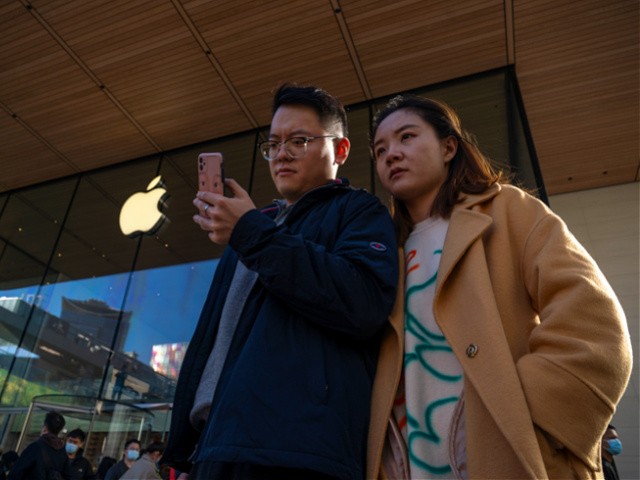Oculus founder Palmer Luckey accused U.S. technology companies at a tech conference last week of shying away from working with the U.S. military because they fear losing access to the Chinese market.
Luckey founded the virtual reality hardware firm Oculus and has since moved on to run Anduril Industries, a startup that sells drone defense systems to the U.S. military and friendly countries.
Discussing his company and the industry generally at the Brainstorm Tech conference hosted by Fortune magazine on Wednesday, Luckey opined that he did not believe that tech companies were avoiding U.S. defense work out of any moral objection to working on military projects.
“I think that’s mostly a smokescreen for the real reason … which is, nobody wants to lose access to Chinese markets, Chinese capital, and Chinese manufacturing,” Luckey said, according to the publication Fast Company, “especially companies like Apple that have invested literally hundreds of billions of dollars and will continue to invest hundreds of billions more.”

People watch a phone in front of an Apple store on October 16, 2021, in Beijing, China. (Photo by Andrea Verdelli/Getty Images)
This is not the first time that Luckey has noted a misalignment between the financial interests of large tech firms and the security interests of the United States.
“China has done an incredible job of using the blocking of access to their markets as a tool to get the culture of Western democracies to subvert itself to China,” he said in a 2020 talk, according to the BBC, adding, “They don’t have to come after us militarily. They don’t have to cut our networks. All they have to do is invest in our companies, do partnerships with our companies.”
This approach to manipulating economic rivals has been called “sharp power,” which a 2018 report released by the Hoover Institution defines as a state leveraging, “a broad range of party, state, and non-state actors to advance its influence-seeking objectives.”
After being fired by Facebook — which is reported to have acquired Oculus for $2 billion — and detecting a gap in the market for defense technology, Luckey founded his current venture, Anduril Industries, to “reboot the arsenal of democracy.” The company’s official mission statement echoes Luckey’s dismissal of the idea that Silicon Valley’s reluctance to work on defense projects is primarily ideological:
Some observers have suggested that young engineers do not wish to work on national security. We disagree — Silicon Valley was founded by patriots pushing science and engineering forward in the national interest and is filled with people eager to do the same again today.
Luckey has repeatedly argued against the notion that tech companies refrain from doing business with the U.S. military due to the ethical objections of their employees, saying, “A lot of companies have financial and PR incentives to stay out of military work, so they’re happy to use these employees as a scapegoat to say ‘we’re listening to our employees,'” according to the BBC.
To the extent that tech companies consider the values of their employees in deciding whether to pursue military contracts, they do so only selectively. The difference between how Google handled two government projects — one for the U.S. government and the other for the Chinese regime — hints that Silicon Valley upholds a double standard in how it deals with the two nations.
Google declined to renew its contract for Project Maven, a program that aimed to use machine learning techniques to help the Pentagon analyze drone footage after employees reportedly circulated a petition in hopes of ending the program.

In this April 28, 2016, file photo, visitors gather at a display booth for Google at the 2016 Global Mobile Internet Conference (GMIC) in Beijing. Google employees are upset with the company’s secretive plan to build a search engine that would comply with Chinese censorship, and a letter signed by more than a thousand of them calls on executives to review ethics and transparency at the company. (AP Photo/Andy Wong, File)
However, in the case of Project Dragonfly — which the far-left publication the Intercept described as an effort to develop a “censored search engine for China” — the company reportedly attempted to conceal the program from its employees and even refused to host a political dissident at its “New York City campus for fear of upsetting the Chinese government.”
While the Intercept reported in December 2018 that Project Dragonfly had been “effectively ended,” the outlet later indicated that there had been “500 changes to the code in December [2018] and more than 400 changes to the code between January and February” in 2019, suggesting that the project was still active.
Peter Thiel, a prominent conservative in tech, lambasted Google’s behavior as “seemingly treasonous” and even called for federal investigations into the company’s practices, particularly around intellectual property transfers.
Like Luckey, Thiel ascribes Google’s behavior to economic coercion, saying that Google allows China to take its IP “because they are making the sort of bad, short-term rationalistic calculation that if the technology doesn’t go out the front door, it gets stolen out the backdoor anyway,” having been “thoroughly infiltrated by Chinese intelligence.”
Meanwhile, a 2o2o report by an Australian think tank revealed that dozens of major brands — such as Apple, Google, and Dell — may have utilized Uyghur slave labor in their supply chains.
Robert Spalding, a retired Air Force brigadier general who served on Trump’s National Security Council as senior director for strategy, notes in his 2019 book Stealth War that China’s 2017 National Intelligence Law “gives intelligence officers the right to designate businesses and individuals as spies,” thereby “sanctioning any and all citizens to acquire plans, data, intellectual property—anything, really—from anyone anywhere.”
You can follow Michael Foster on Twitter at @realmfoster.

COMMENTS
Please let us know if you're having issues with commenting.